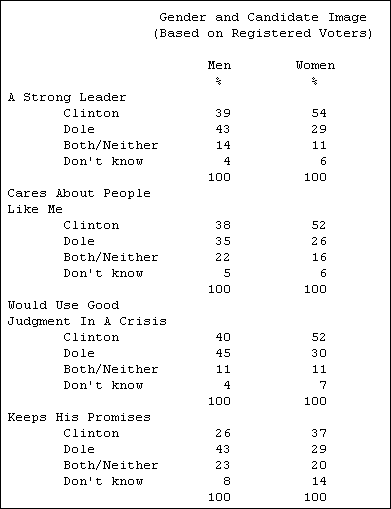The Times Mirror Center in 1987 developed a unique voter classification system based on three major elements — party affiliation, political participation, and personal values and attitudes — and using the statistical technique called “cluster analysis.” The new typology developed in 1995 is built on the same foundation, with minor modifications.
Nine values and attitudes were measured, including attitudes toward government, environmentalism, business, social welfare, social policy issues, religion, race relations, the military, and feelings of political alienation.
The analysis segmented the American public into ten groups — three Republican, four Democrat, and three in between:
The Divided Right
- Enterprisers (12% of adult population): Affluent, well-educated, and predominantly white. This classic Republican group is mainly characterized as pro-business, anti-government, anti-social welfare.
- Moralists (15%): Middle-aged, middle-income, predominantly white, religious (more than half are Evangelicals). This core Republican group is also socially intolerant and anti- social welfare, militaristic, anti-big business and anti-big government. Former Democrats drawn to the GOP’s religious and cultural conservatism have increased in size substantially since 1987.
- Libertarians (7%): Highly-educated, affluent, predominately white male. This group has Republican lineage but is uncomfortable with today’s GOP, particularly its religious right. Pro-business, anti-government, anti-social welfare but highly tolerant, very low on religious faith, cynical about politicians.
The Detached Center
- New Economy Independents (14%): Average income, young to middle aged, mostly female. This group is unanchored in either party and many supported Perot in 1992. It has many conflicting values: strongly environmentalist but not believers in government regulation; pro-social welfare but not very sympathetic to blacks; inclined to fundamental religious beliefs (highest white Catholic group) but highly tolerant of homosexuals.
- Bystanders (10%): Very young, poorly educated, with low income. This group opts out of the political process or are not eligible to vote (highest Hispanic concentration). Slightly more female than male, its only claimed commitment is to environmentalism.
- The Embittered (6%): Low income, low education, middle-aged. One in five of this group are black, one in three have children under 18. Old ties to Democrats have eroded but the Embittered feel unwelcome in the GOP. They distrust government, politicians, corporations. They are religious and socially intolerant. They strongly blame discrimination for lack of black progress, but are not strongly in favor of social welfare programs.
The “Not So” Left
- Seculars (7%): Highly educated, sophisticated, affluent, mostly white baby boomers and Generation X. The most socially tolerant group, driven by social issues, it is the only one to embrace the “liberal” label. Very low in religious faith. Highly pro-environment, pro-government, distrusting of business.
- New Democrats (12%): Mostly female, below average income and average education, includes a high proportion of white Catholics (30%) but also many white Evangelical Protestants (19%). Religious but not intolerant, more pro-business than other Democratic groups, they reject discrimination as a major barrier to black progress, are pro-government and environmentalist.
- New Dealers (8%): One of the oldest groups in the typology (three in ten over 65), below average education and low income. Once part of FDR’s coalition, beneficiary of government programs, this group is now turned off by politics. Strongly conservative on race and social welfare, strong on religion, moderate on social tolerance, pro-America, distrustful of politicians and business.
- Partisan Poor (9%): Very poor (26% with household income under $20,000 a year), disadvantaged, about one in three in the south. Rooted in New Deal coalition, this group believes more government spending on the poor is needed. More than one-third are non-whites. Very religious and socially conservative.
